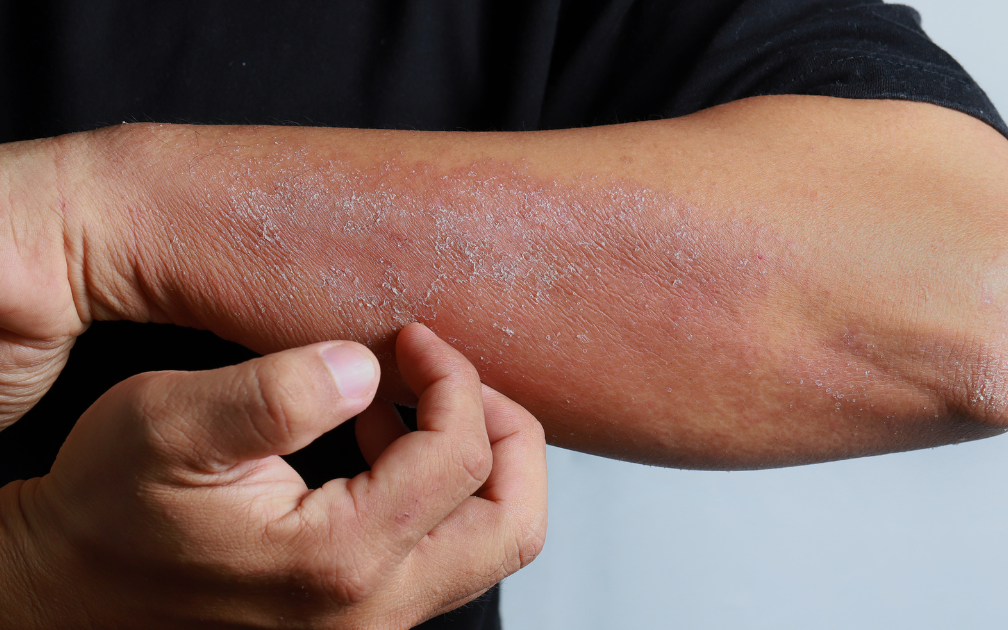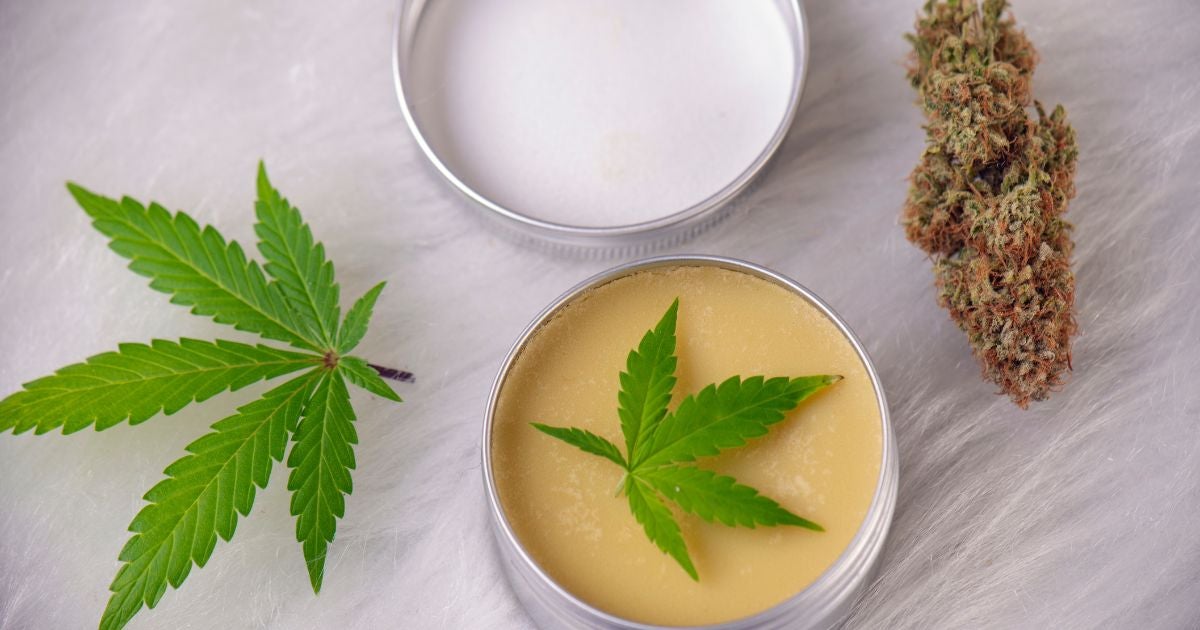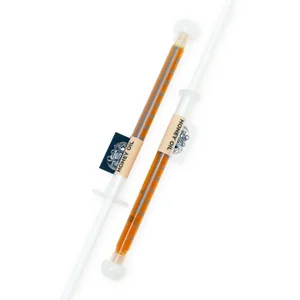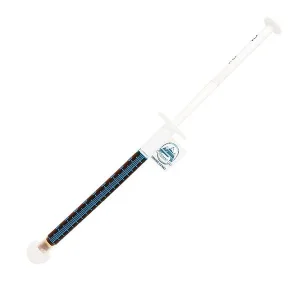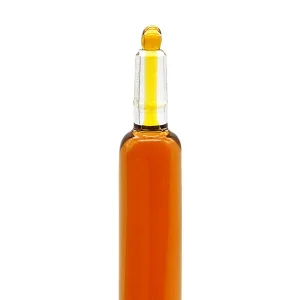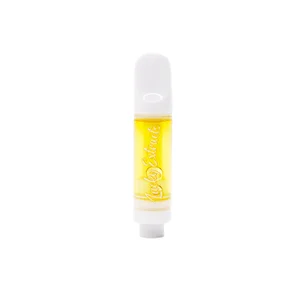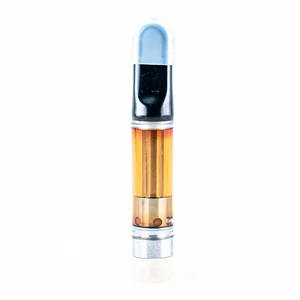The Power of Cannabis Oil for Eczema: Unveiling Its Potential Benefits
Table of Contents
- Benefits of Cannabis Oil for Eczema
- Methods of Using Cannabis Oil for Eczema
- Other Natural Remedies and Lifestyle Tips
- Conclusion
- Frequently Asked Questions
Eczema can be a persistent and frustrating skin condition, but there is hope. In this comprehensive guide, we review cannabis oil and its potential to soothe and heal eczema symptoms. From its anti-inflammatory properties to its rich nutrient profile, we explore the science behind cannabis oil’s effectiveness in alleviating eczema by providing insights, recommendations, and personal experiences to help you embrace a path to healthier, happier skin.
Understanding Eczema
Eczema, also known as dermatitis, encompasses various types, including atopic dermatitis and contact dermatitis. Atopic dermatitis is the most common form and is often linked to genetic factors, environmental irritants, or a combination of both. Contact dermatitis, on the other hand, is triggered by direct contact with allergens or irritants like certain fabrics or chemicals.
The impact of eczema on the skin can be quite distressing. It leads to dryness, itchiness, and inflammation, making it difficult for individuals to find relief. The constant urge to scratch can worsen the condition, causing the affected skin to become more irritated and prone to infections.
Here’s a relevant statistic for you: Eczema affects approximately 15-20% of children and 1-3% of adults worldwide. These numbers illustrate the significant impact of eczema on individuals of all ages.
The Science Behind Cannabis Oil
Cannabis oil, derived from the Cannabis sativa plant, contains various cannabinoids, including CBD (cannabidiol) and THC (tetrahydrocannabinol). These cannabinoids interact with the body’s endocannabinoid system (ECS), which plays a crucial role in regulating skin health and inflammatory responses.
The ECS is a complex network of receptors found throughout the body, including the skin. It helps maintain balance and homeostasis, contributing to overall well-being. When it comes to eczema, cannabinoids like CBD have shown promise in reducing inflammation and alleviating symptoms. For this reason, CBD is commonly used to treat skin conditions and soothe symptoms.
Scientific studies and clinical trials have provided valuable insights into the potential benefits of cannabis oil for eczema sufferers. For example, one study found that CBD could inhibit the production of inflammatory molecules and regulate immune responses in skin cells. Another study demonstrated the anti-inflammatory effects of CBD on eczema-like skin conditions.
These findings are encouraging and offer hope to individuals seeking alternative solutions for their eczema symptoms. By leveraging the anti-inflammatory properties of cannabis oil, they may find relief from the persistent itchiness and discomfort associated with eczema.
Benefits of Cannabis Oil for Eczema
Describe the potential benefits of using cannabis oil to alleviate eczema symptoms.
Cannabis oil has gained attention for its potential benefits in alleviating eczema symptoms. Let’s dive into how this natural remedy can make a difference for individuals struggling with this skin condition.
Reducing Inflammation, Itching, and Pain
One of the primary advantages of cannabis oil for eczema is its ability to reduce inflammation, itching, and pain. The cannabinoids found in cannabis oil, particularly CBD, have shown anti-inflammatory properties. By interacting with the ECS and targeting inflammatory responses in the skin, cannabis oil can help calm the irritated and inflamed areas commonly seen in eczema.
Individuals who have incorporated cannabis oil into their eczema management routine often report a decrease in redness, swelling, and discomfort. The soothing effects of cannabis oil can provide much-needed relief and improve the overall quality of life for those with eczema.
Moisturizing Properties and Improved Skin Barrier Function
Eczema-prone skin tends to be dry, itchy, and more susceptible to irritants. Cannabis oil offers moisturizing properties that can help combat these issues. It contains essential fatty acids, such as omega-3 and omega-6, which nourish the skin and promote hydration.
Moreover, cannabis oil has been found to enhance the skin barrier function. The skin barrier acts as a protective shield, preventing moisture loss and shielding the skin from external irritants. By improving the skin barrier, cannabis oil can help reduce the severity of eczema symptoms and create a more resilient skin environment.
Anecdotal Evidence and Testimonials
While scientific research on cannabis oil for eczema is still ongoing, anecdotal evidence and testimonials from individuals who have tried it are worth considering. Many eczema sufferers have shared their positive experiences with cannabis oil, noting significant improvements in their symptoms.
These firsthand accounts often highlight the soothing effect of cannabis oil, its ability to calm itching and inflammation, and the overall relief it provides. While anecdotal evidence should be viewed with caution and not replace scientific research, these testimonials reflect the growing interest and potential of cannabis oil as a viable option for managing eczema symptoms.
Methods of Using Cannabis Oil for Eczema
Explore Different Application Methods
When it comes to using cannabis oil for eczema, there are various application methods to consider. Topical creams, ointments, and balms are among the most common options. These products are specifically formulated for skin application and are designed to deliver the benefits of cannabis oil directly to the affected areas.
Topical cannabis oil products are preferred by many individuals with eczema due to their localized effect. They allow for targeted application and provide relief precisely where it’s needed. Additionally, these products often contain other beneficial ingredients, such as moisturizers and soothing botanical extracts, which can complement the effects of cannabis oil.
Choosing High-Quality, Lab-Tested Products
When selecting cannabis oil products for eczema, it’s essential to choose high-quality options that have undergone rigorous lab testing. This ensures that the product is free from contaminants and accurately labeled regarding cannabinoid content.
Reputable brands provide third-party lab reports, which offer transparency and assurance regarding the product’s quality and safety. These reports verify the potency of cannabinoids and confirm the absence of harmful substances like pesticides, heavy metals, or residual solvents. By opting for lab-tested cannabis oil products, individuals can have confidence in the purity and effectiveness of what they’re using.
Usage Instructions and Dosage Recommendations
To use cannabis oil effectively for eczema, it’s crucial to follow the manufacturer’s usage instructions and dosage recommendations. Each product may have specific guidelines based on its concentration and formulation.
Usage instructions typically involve applying a small amount of cannabis oil to the affected areas of the skin. It’s important to gently massage the oil into the skin until it is fully absorbed. The frequency of application can vary, ranging from once or twice a day to multiple times throughout the day, depending on the severity of the symptoms and the specific product.
Dosage recommendations for cannabis oil can vary based on factors such as the concentration of cannabinoids, the individual’s body weight, and their tolerance to cannabis products. It is advisable to start with a low dosage and gradually increase it as needed while monitoring the skin’s response. Consulting with a healthcare professional or a knowledgeable cannabis specialist can provide personalized guidance on the appropriate dosage for individual circumstances.
Precautions and Potential Side Effects
While cannabis oil can offer potential benefits for eczema, it’s important to be aware of any precautions or potential side effects. Although side effects are generally minimal, they can include mild skin irritation, redness, or allergic reactions. It’s crucial to perform a patch test on a small area of skin before applying cannabis oil to larger areas to check for any adverse reactions.
Individuals with sensitive skin or a history of allergies should exercise caution and consult with a healthcare professional before using cannabis oil. Additionally, it’s advisable to avoid using cannabis oil on broken or open skin as it may increase the risk of infection.
It’s worth noting that cannabis oil derived from hemp contains low levels of THC, the psychoactive compound found in marijuana. As a result, it is unlikely to cause any intoxicating effects when used topically. However, individuals should ensure that the cannabis oil they choose complies with legal regulations and contains THC levels within permissible limits.
Other Natural Remedies and Lifestyle Tips
Complementary Natural Remedies
In addition to cannabis oil, there are other natural remedies that can be used as complementary approaches for managing eczema symptoms. Here are a few examples:
- Coconut Oil: Known for its moisturizing properties, coconut oil can help soothe dry and irritated skin. Apply a thin layer of organic, unrefined coconut oil to the affected areas to provide hydration and reduce itchiness.
- Aloe Vera: The gel extracted from aloe vera leaves has cooling and anti-inflammatory effects, making it beneficial for eczema. Apply pure aloe vera gel to the affected skin to alleviate redness and promote healing.
- Oatmeal Baths: Adding colloidal oatmeal to a lukewarm bath can provide relief from itching and inflammation. Oatmeal has soothing properties that can help calm eczema-prone skin. Ensure that the oatmeal used is specifically formulated for bathing purposes.
It’s important to note that natural remedies may work differently for each individual, so it’s worth experimenting to find what works best for your specific situation. As always, consult with a healthcare professional before incorporating any new remedies into your eczema care routine.
Lifestyle Modifications
Beyond natural remedies, certain lifestyle modifications can play a significant role in managing eczema:
- Avoiding Triggers: Identify and avoid triggers that worsen your eczema symptoms. Common triggers include certain fabrics, harsh soaps or detergents, pet dander, pollen, and stress. By minimizing exposure to these triggers, you can help prevent flare-ups.
- Good Skincare Habits: Establish a skincare routine that caters to your eczema-prone skin. Use gentle, fragrance-free cleansers and moisturizers to keep your skin hydrated and protected. Pat your skin dry after bathing instead of rubbing, and wear soft, breathable fabrics to minimize irritation.
- Maintaining Overall Skin Health: Take a holistic approach to your skin health. Eat a balanced diet rich in fruits, vegetables, and omega-3 fatty acids, as these nutrients can support skin health. Additionally, practice stress management techniques, such as meditation or yoga, as stress can exacerbate eczema symptoms.
Remember, it’s important to consult with a healthcare professional to develop an eczema management plan tailored to your specific needs. They can provide personalized recommendations based on your medical history and individual circumstances.
Conclusion
In conclusion, cannabis oil offers promising potential as a natural remedy for eczema, with its anti-inflammatory properties and ability to improve skin barrier function. However, it’s crucial to consult healthcare professionals before embarking on this journey. Alongside cannabis oil, complementary remedies like coconut oil, aloe vera, and soothing oatmeal baths can provide additional relief. Don’t forget the importance of lifestyle modifications, such as identifying triggers, practicing good skincare habits, and maintaining overall skin health. By combining these strategies, you can embark on a personalized eczema management plan, embracing the power of nature and nurturing your skin towards a calmer, healthier state.
FAQs
What oils are best for eczema?
There are several oils that can be beneficial for eczema-prone skin. Some of the best options include coconut oil, jojoba oil, and sunflower oil. These oils have moisturizing properties and can help soothe dryness and irritation associated with eczema.
Can cannabis oil be applied directly to the skin?
Yes, cannabis oil can be applied topically to the skin for eczema. It is important to choose a high-quality cannabis oil product that is specifically formulated for topical use. Applying cannabis oil directly to the affected areas can help reduce inflammation and provide relief from itching and discomfort.
What is CBD oil good for eczema?
CBD oil has shown potential for alleviating eczema symptoms. It has anti-inflammatory properties that can help reduce redness, swelling, and itching associated with eczema. Additionally, CBD oil can moisturize the skin and improve its barrier function, which is beneficial for individuals with eczema.
Can CBD oil heal skin?
While CBD oil may help manage eczema symptoms, it is important to note that it does not cure the condition. CBD oil can provide relief by reducing inflammation and soothing irritated skin, but it does not address the underlying causes of eczema. It is best used as part of a comprehensive eczema management plan.
What are the side effects of CBD oil?
CBD oil is generally well-tolerated, and side effects are rare and usually mild. However, some individuals may experience dry mouth, drowsiness, or changes in appetite. It is important to start with a low dosage and monitor your body’s response. If you experience any adverse effects, discontinue use and consult with a healthcare professional.


